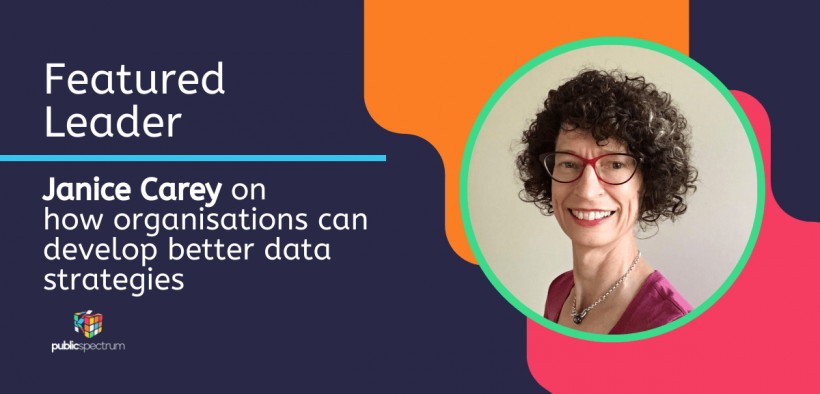Janice Carey on how organisations can develop better data strategies
Share

As technology continues to integrate itself across multiple aspects of society, organisations are now more pressed than ever to have data strategies that will not only help them improve but also keep them resilient in times of great disruption.
Public Spectrum has caught up with Janice Carey, one of IAPA’s top analytics leaders for 2022, for her insights regarding data strategies.
Janice Carey is the former Head of Data Strategy at Bupa Australia and New Zealand and is currently an adjunct Associate Professor at DeakinCo. Janice helps courageous C-Suite leaders in innovative and practical ways to make great decisions and drive financial performance.
Her previous roles involved the establishment of a new enterprise insights capability at Monash University and senior appointments at IBM. Janice holds an MBA and a Bachelor of Engineering.
In this interview, she explains how organisations can develop better data strategies.
In what ways can organisations effectively utilise raw data for their benefit?
Raw data is a fantastic resource for all analytic modes from reporting through to AI and Machine Learning. In the curated and structured world of dashboards and reports, raw data needs to be cleaned and structured to unlock value.
For AI and Machine Learning, it’s preferable to use data in its raw form, sometimes with light cleansing, so we can identify patterns to project into the future to make predictions.
Understanding there are multiple uses for the same pool of raw data is powerful. With the right architectures, organisations can unlock value for complementary pursuits to achieve deeper and broader impact from the same underlying data assets.
A great example is combining digital streaming data with customer reference data to enrich the online digital experience for customers, adding relevance and appeal to what’s offered with a predictive Machine Learning model, and then measuring impact and performance uplift with real-time dashboards.
What are the issues you’ve commonly faced in your field and how were you able to resolve them?
Many organisations find it challenging to leverage value from significant technology spend on data platforms. To be fair, there are many complexities to navigate!
An approach I’ve found useful is to be clear on the target state in terms of a scalable platform architecture and how data, skills, process and governance need to operate together. A North Star if you will.
The key then is to build a small but scalable first instance around an iconic entity, like customers. This is used to solve a first business pain point, shake down technical wrinkles and develop a business problem-solving culture.
In parallel, there’s some foundational heavy lifting around data integration, data quality, governance and operations. The key is to deliver business value frequently to justify progressive investment while also building organizational muscle and mindset. I call this a learn-by-doing model.
How has technology helped you in your profession as a chief data officer over the years?
In thinking about our technology investments, it’s key to recognise that we need to have the capability to address emergent market dynamics and new business problems all the time.
Big bang waterfall projects with prolonged lead times can fail to deliver full value before needs change, and poor choices can be magnified before the need for corrective action is recognised. The pace of change continues to accelerate so designing platforms to be adaptable is key, along with the mindset that perpetually scans the horizon for new developments. To do this it’s super important to attract and develop talent. It’s always been true and is even more so in the current climate.
As one of IAPA’s top analytics leaders for 2022, what is your advice for organisations wishing to improve their data strategies?
My advice is we must clearly articulate the capability we seek to create before embarking on solution build. Analytics is a team sport and to flourish there needs to be a culture where the board, executives, business and data professionals acquire the shared language and data fluency to challenge and engage each other to solve problems and identify new opportunities, then take action on insights.
And the adventure from there is building momentum so that each insight and intervention builds on the last.
Want to learn more about data strategy? Join us at the 2nd Annual Australian Data Summit by clicking here.
Eliza is a content producer and editor at Public Spectrum. She is an experienced writer on topics related to the government and to the public, as well as stories that uplift and improve the community.


Today’s Pick
11th Annual Aus Goverment Data Summit
April 1, 2025
7th Annual NZ Government Data Summit
May 7, 2025
3rd Public Sector Comms Week
May 14, 2025
Subscribe
We send emails,
but we do not spam
Join our mailing list to be on the front lines of healthcare , get exclusive content, and promos.
AI appointment Australia Australian boost boosts business businesses covid-19 cyber cyber attack cybersecurity cyber security data data breach data management defence Digital employment enhance enhances fraud funding governance government grants infrastructure Innovation Lockdown management new zealand NSW NZ online privacy public Public Sector queensland renewable energy scams security Social Media Technology telecommunications victoria
-

Understanding and building your digital strategy
Digital Government, Opinion
-

Featured Leader: Jamie Morse on multi-channel strategies for communication
Communications, Featured Leader
-

Featured Leader: Tegan Tembe of NSW Treasury on creating solid planning strategies and processes
Featured Leader
-

Wirraka Maya Health Service improves patient care with My Health Record
Learning
Show More-

Effects of ineffective communication in the workplace
Communications, Personal Development
-

7 ways you can enhance your personal development skills
News, Personal Development
-

5 advantages of working in the public sector
News, Personal Development, Professional Development
-

7 causes of communication issues in the workplace
Communications, News, Personal Development
Show MoreLast Viewed